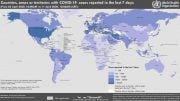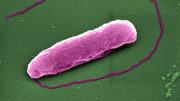- Without urgent action, superbugs will kill 22,000 Australians a year by 2040
- A comprehensive national database is needed to capture infection rates and arrest the spread
- Some AMR deaths may have been erroneously attributed to COVID-19
Superbugs threaten to be the next great health crisis of our time, claiming many more lives than COVID-19, and a comprehensive national infection database is urgently needed to arrest the spread, Monash University researchers say.
On the eve of World Antimicrobial Resistance Awareness Week (November 18-24), Monash infectious diseases experts said a register that systemically captures all patient-level data, would spotlight the growing superbug emergency and put it firmly on the public health agenda.
Superbugs – bacteria, viruses, fungi, and parasites that are immune to antibiotics and other pharmaceuticals – are predicted to kill 22,000 Australians a year by 2040. The World Health Organization (WHO) estimates that 10 million people will die from antimicrobial resistant (AMR) infections globally by 2050.
Dr. Nenad Macesic, from Monash’s Department of Infectious Diseases, Central Clinical School, says the superbug data currently recorded by the Antimicrobial Use and Resistance (AURA) surveillance system is too narrowly focused on pathogens and AMR in a laboratory setting. A broader register, including clinical patient-level data, would help capture the true impact of AMR. Many superbug infections currently go unrecorded and the cause of death in some cases may be erroneously attributed to a co-existent condition.
“The true death rate could be captured by ascertaining whether patients had an AMR infection at the time of death or shortly preceding it,” Dr. Macesic says. “This would likely identify a greater number of patients where AMR infection may have contributed to their death, including in COVID-19 patients.
“A critically ill COVID-19 patient might develop an AMR infection in intensive care that is ultimately fatal, however their death may nevertheless be attributed to COVID-19.”
The solution to superbugs is twofold – reducing the spread of AMR by limiting the use of antimicrobials in human and animal health and agriculture, and developing new antibiotics and novel therapies that can combat disease immune to conventional treatments.
AMR already affects some patients’ candidacy for medical procedures, such as bone marrow and organ transplants, and without urgent intervention the risk will intensify. Yet superbugs lack sufficient public health funding and awareness.
“In many ways, it is analogous to climate change; a gradual change that is almost imperceptible until we start running into very significant problems with many patients having infections that are almost impossible to treat,” Dr. Macesic says. “We need to get the message out there that this threat is very real and requires immediate action.”
Professor Andrea Whittaker from the Monash Centre to Impact AMR says AMR is a “slow and silent emergency” that affects not just hospitals but the community at large. However, there has been no federal commitment for a National Implementation Plan on superbugs, or funding for social and behavioral research.
“We need to consider how best to implement plans to slow and limit the spread of AMR through educating ourselves about its causes and adopting a more judicious use of antimicrobials in human and animal health and agriculture.”










It’s a big reason why research into aging reversal to keep the immune system strong should be prioritized.
I am a victim of MRSA for 10 yrs with continued outbreaks no prevail of hope.you asked for a comment all I can say is we need to stop this way more important problem than covid 19 I wish many prayers to the superbug cause
Who cares. Thin the herd.
Africans and Asians first